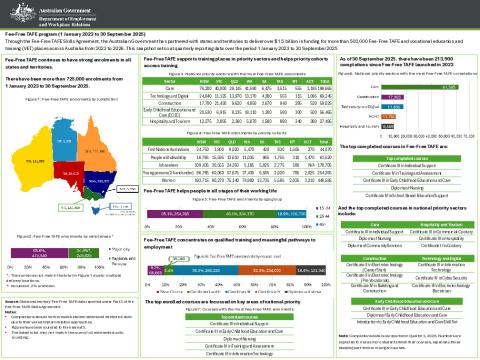Through the Fee-Free TAFE Skills Agreement (formerly known as the 12-Month Skills Agreement), the Commonwealth Government has partnered with states and territories to deliver over $1.5 billion funding for 500,000 Fee-Free TAFE and vocational education and training (VET) places across Australia over 2023 to 2026.
On this page:
The Australian Government partnered with state and territory governments to establish the $1 billion 12-month Skills Agreement to deliver an initial 180,000 Fee-Free TAFE and VET places from January 2023. The Australian Government contribution of $493 million to support the delivery of training places was matched by states and territories.
In August 2023 the Australian Government announced an additional $414.1 million for a further 300,000 TAFE and VET places to be made fee-free from January 2024, with these places currently being rolled out nationally.
As part of the 2024-25 Budget, the Australian Government has committed an additional $86.4 million for states and territories to deliver a further 20,000 Fee-Free TAFE and VET places, including approximately 5,000 pre-apprenticeship places, over two years from January 2025, to boost the supply of the construction industry.
Further information about these additional places will be available in due course.
The Fee-Free TAFE Skills Agreement sets out training places across the following areas of national priority:
- agriculture
- care (including aged care, health care and disability care)
- construction
- defence
- early childhood education and care
- hospitality and tourism
- manufacturing
- sovereign capability
- technology and digital
- VET workforce from 2024.
The Australian Government has identified that Fee-Free TAFE will be prioritised for a number of priority groups, noting that specific details on priority groups, qualifications and courses may differ in each state and territory.
Priority groups include:
- First Nations Australians
- young people (17-24)
- people who are out of work or receiving income support payments
- unpaid carers
- women facing economic insecurity
- women undertaking study in non-traditional fields
- people with disability
- certain categories of visa holders.
Fee-Free TAFE Program Snapshot – Quarter 3, 2025
The Fee-Free TAFE Program Snapshot provides a breakdown of enrolment and completion data from January 2023 to 30 September 2025. It includes visualisations and sector-level insights, highlighting the top five courses by enrolments and completions.
Fee-Free TAFE Enrolment Data Overview archive
More information
- Budget 2024-25: Skilling the Construction Workforce
- For Fee-Free TAFE course eligibility, and to search industries and occupations to find a career that's right for you, visit Fee-Free TAFE | Your Career.
- Minister for Skills and Training media centre.
- Skills and Workforce Ministerial Council communiques

